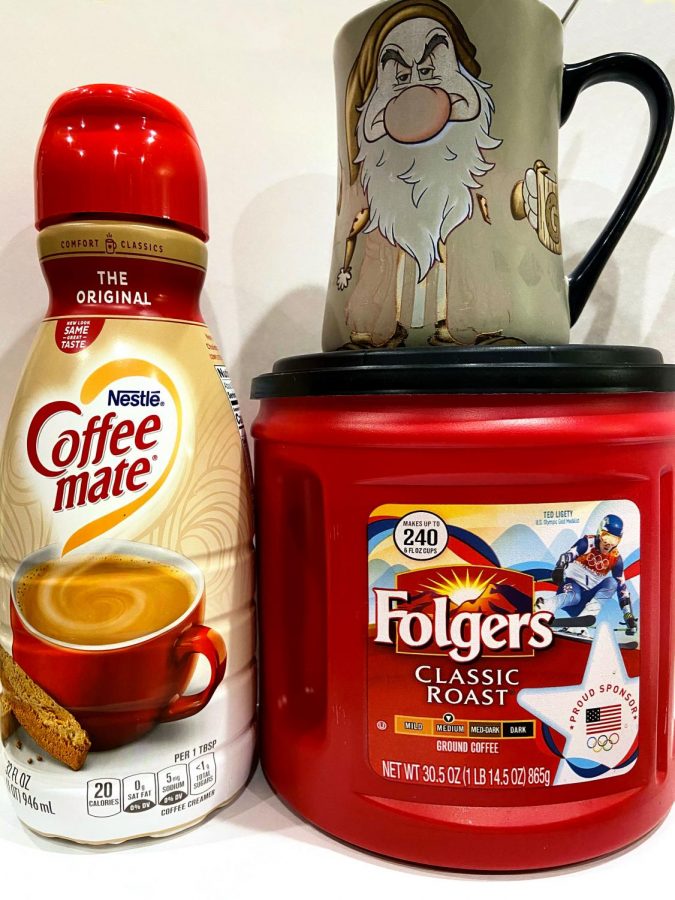Caffeine: A Trendy New Addiction
May 22, 2020
Drinking coffee at a young age could affect your health. Caffeine is addicting, which means that the more you drink, the more you need and want to have it. It means that when you don’t have it you could get a headache, the “shakes” or jittery, and feel ‘not yourself’ without it. Side effects include symptoms of withdrawal, which anyone on drugs can experience, though the symptoms can be different for each person. This is why drug addicts keep going back for more drugs, because without them, they feel terrible and the only way to correct that is to take more.
It’s the same with caffeine. It’s a stimulant, which means it keeps your brain and body awake. While a morning cup won’t disrupt your sleep at night, an afternoon cup could. This means that it can take you longer to fall asleep, and even interfere with a good night’s sleep. Doctors tell us that on average teens need about 7 to 8 hours of sleep each night. If your teen is not getting that amount, you can see effects on grades, mood, and depending on what your teen puts in his or her coffee, there can be side effects on weight status. For example, iced vanilla lattes and other specialty drinks are often high in caffeine, fat and sugar, which means extra calories that may encourage unwanted and unhealthy weight gain.
On a daily basis about 64 percent of Americans drink coffee on a daily basis. And according to CreditDonkey all together Americans drink about 102 cups of coffee annually. Older Americans are the biggest coffee drinkers, with 74% of seniors aged 55 and up having at least one cup of coffee per day. The 18 to 34-year-old crowd drink the least amount of coffee. But what about types of coffee? The newest generation of regular coffee drinkers is driving an upward trend of gourmet coffee consumption. More than one-third of the gourmet drinks (like cappuccino and lattes), and 22% of people in the 18-24 age group drink espresso. And are more likely than their older peers to drink their coffee away from home from shops like Starbucks and BigFoot Java.
But while there are some health concerns there are also benefits. Coffee is not just a drink it can also be a social interaction tool. In fact getting coffee is an affordable experience many teens like to participate in together. Many teens also drink it as a source to quickly relieve drowsiness, which can be handy for individuals who might be tired after a late night of studying for an exam or a busy schedule that includes part-time work on the weekend. Or even used as a memory boost according to Healthy Eating, “Many teenagers often spend a significant part of the week studying for tests, presentations and exams. Drinking a single cup of strong coffee, according to a 2014 study published in “Nature Neuroscience,” can improve your memory. If a student struggles with memorizing information for schoolwork, moderate coffee drinking might help keep her memory sharp for up to 24 hours or even beyond.”
Getting your daily intake of caffeine can be through other potentially healthier forms. Shape a daily fitness, health, and lifestyle website promotes 15 alternatives to caffeine. Green Tea “Can’t make it through the morning without your daily java? Try brewing some green tea, which has slightly less caffeine than a cup of Joe but enough to give you a boost without any of the coffee jitters. The refreshing drink is also packed with health benefits, says Nadine Taylor, registered dietitian and author of Green Tea: The Natural Secret to a Healthier Life. “Catechins are powerful antioxidants and potent disease fighters that are found primarily in green tea,”
At the end of the day it comes down to preference, why you would drink the drink and what form it may derive from. Some people drink coffee to stay awake, or to get a little boost of energy, some love the way it tastes and enjoy the many complex ways it can take shape like in the form of an espresso or a frappuccino. Or even the memories they associate with the drink, when an order from Starbucks could remind you of when you went out with your friends during lunch and got a flat tire on the way back during the hour (may or may not be speaking from personal experience). A drink is a drink, but it is important to know the benefits but also potential health concerns associated with it, as it may impact your health later down the line. Keep this in mind the next time you take a sip of that latte.



